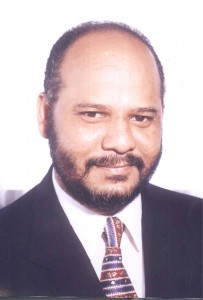With major investments the police force is making greater inroads on crime, but its success is being undermined by weak prosecution and a fixation with the rights of criminals, Home Affairs Minister Clement Rohee said.

Responding to questions after handing over a vehicle to the Enmore/Foulis community policing group, Rohee yesterday said Guyana is not worse off than it was this time last year in terms of the state of crime. Although he said it is still fairly early in the year, the police force has already made accomplishments on some major incidents of crime and he pointed to the recent police killing of Courtney James, who was wanted in connection several armed robberies.
Questioned on the force’s inability to crack a number of unsolved murder cases, Rohee said he was unsure whether it was a matter of capacity–even though Crime Chief Seelall Persaud had identified this as one of the challenges for the police in making major breakthroughs in high-profile murders. The minister emphasised that the government has spent huge amounts of money to improve the institutional, technological and other capacities of the police force and the joint services as a whole to a better position than they were five years ago. He said areas such as tracking criminals and criminal investigations are where capacity was boosted.
‘Hearing aids’
Rohee also pointed out that the citizen’s security programme is moving apace and that there are plans to commission remodelled police stations later in the year, especially to deal with matters which require confidentiality, like domestic violence. He also revealed that it is hoped that by the end of the year the construction of Inter–American Development Bank (IDB)-funded Forensic Laboratory will begin and he was also optimistic about the start of a GPF training centre.
However, he lashed out at critics of the government’s approach to police reform, while adding that some of them believed that that the UK-funded Security Sector Reform Action Plan was the “end all” of police reform. “It was part of the reform process,” he said. “Hearing aids for those persons; just like condoms are distributed we will be distributing hearing aids free of cost to persons who need to build hearing capacity… it’s either they not hearing well or not listening.”
And while he lauded the work of some policing groups in assisting the police in apprehending criminals in communities, he complained about a “preoccupation” with the welfare of the perpetrator and the constant dismissal of cases. “Too often the police [are] apprehending suspects in many cases, present reports to DPP, who recommend certain charges and these persons appear before the court and their cases are adjourned for reasons which I cannot say so much, so that eventually we have situations where witnesses no longer come forward to testify. Reasonable time evaporates and their cases are dismissed,” he explained.
‘Brickdam is not Buddy’s’
He added that many times persons are put on bail and they go back out and commit more crimes and create more difficulties for the police to apprehend them. Additionally, Rohee said, often the concerns of the victims of crimes are overlooked. “We are too often concerned about the welfare of the perpetrators. For example, ‘Is the lock-ups clean for him? Is he being given cooked vegetables, salad and desert? Is he able to wash and bathe every half day?’ But what about the person who was affected? What about the victim? I rarely see persons paying attention to the victims,” he said, adding that only when persons are personally affected do they come forward screaming for their needs to be addressed.
Rohee recommended a more balanced approach, saying too many persons are on the sideline taking the position that the perpetrator of the crime must be given justice. Against that background, he was questioned about the consideration of human rights and asked too whether he was suggesting that there be less focus on human rights. “Human rights is human rights. All that I am saying is that there must be a balanced approach. This does not mean giving human rights to the one person who is involved to the disadvantage of the other. A person has committed a crime, murdered or shot someone. What about that person who suffered the trauma? What about the children who witness? Where should they be placed?” he queried.
Asked about the continuing concerns about the insanitary conditions at Brickdam lock-ups, he said, “As I said before, a police station lock-up is not a hotel room at Buddy’s or Pegasus. If you don’t want to go in a police lock-ups stay out of trouble. Walk the straight and narrow line. Once you want to commit an infraction of the law and are apprehended, you have to suffer the consequences. All societies are made up in this way.”
However the minister added that efforts are being made to ensure that rehabilitation of the lock-ups are completed by next year. But he noted that all the lock-ups around the country could not be done at the same time.



